

Meet the Plastic Man of India. He Made Roads Made of Plastic Waste. Plastic roads: India’s radical plan to bury its garbage beneath the streets. Jambulingam Street, Chennai, is a local legend.
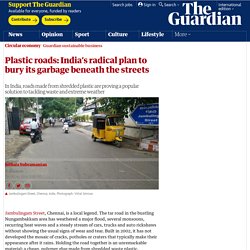
The tar road in the bustling Nungambakkam area has weathered a major flood, several monsoons, recurring heat waves and a steady stream of cars, trucks and auto rickshaws without showing the usual signs of wear and tear. Built in 2002, it has not developed the mosaic of cracks, potholes or craters that typically make their appearance after it rains. Holding the road together is an unremarkable material: a cheap, polymer glue made from shredded waste plastic. Jambulingam Street was one of India’s first plastic roads . The environmentally conscious approach to road construction was developed in India around 15 years ago in response to the growing problem of plastic litter. Brilliant zero-energy air conditioner in India is beautiful and functional. Plastic Free Zero Waste Shop London. Wind, solar and electric cars are booming. Too bad that’s not enough to stop climate change. The tough thing about halting climate change is that it means altering pretty much everything about how we get and use energy.
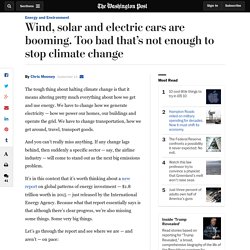
Waste not want not: Sweden to give tax breaks for repairs. The Swedish government is introducing tax breaks on repairs to everything from bicycles to washing machines so it will no longer make sense to throw out old or broken items and buy new ones.
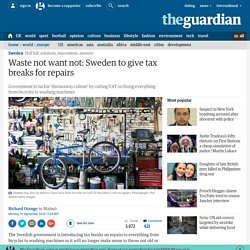
Sweden’s ruling Social Democrat and Green party coalition is set to submit proposals to parliament on Tuesday to slash the VAT rate on repairs to bicycles, clothes and shoes from 25% to 12%. It will also submit a proposal that would allow people to claim back from income tax half of the labour cost on repairs to appliances such as fridges, ovens, dishwashers and washing machines.
“We believe that this could substantially lower the cost and so make it more rational economic behaviour to repair your goods,” said Per Bolund, Sweden’s minister for financial markets and consumer affairs and one of six Green party cabinet members. Tesla and Exxon agree, it's time for a carbon tax [Video] Investors' neglect of small-scale renewables threatens universal energy access. Investing in a large-scale wind farm is a better guarantee of profits than multiple, small, off-grid renewables projects but without the latter, argues a recent report, the sustainable development goal of low-carbon energy access for all will never be met.

It is estimated (pdf) close to $50bn a year is needed to achieve universal access to electricity and clean cooking facilities by 2030. Yet traditional forms of climate finance are not working. The result, according to the report (pdf) from the International Institute for Environment and Development (IIED), is major bottlenecks in funding for many small-scale renewable energy services such as solar home systems, mini-grids and clean cooking facilities.
To build a better future, we must imagine ourselves there. Welcome to earthships: an off-the-grid solution to Canada's housing crisis? This Dutch town will grow its own food, live off-grid, and handle its own waste. It's no secret that today's aggressive agricultural techniques can take a heavy toll on the environment, both on the land used for crops and livestock, and in the surrounding atmosphere.
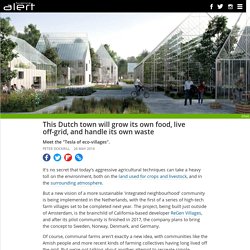
But a new vision of a more sustainable 'integrated neighbourhood' community is being implemented in the Netherlands, with the first of a series of high-tech farm villages set to be completed next year.
Energy. Gardening and compost. Solar powered Reverse Osmosis water purification system. The Reign of Recycling. Photo IF you live in the United States, you probably do some form of recycling.
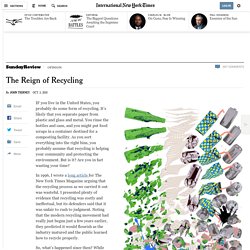
It’s likely that you separate paper from plastic and glass and metal. You rinse the bottles and cans, and you might put food scraps in a container destined for a composting facility. As you sort everything into the right bins, you probably assume that recycling is helping your community and protecting the environment. 10 Critical Corporate Sustainability Trends to Watch in 2015 and Beyond. Five trends in sustainable business for 2015. At the Carbon Trust our team of expert consultants work across a wide range of sectors, supporting businesses in reducing their environmental impact, using resources more efficiently, and taking advantage of the opportunities arising in a sustainable, low carbon economy.
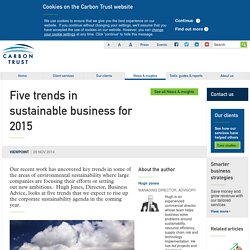
Recent work has uncovered key trends in some of the areas of environmental sustainability where large companies are focusing their efforts or expressing new ambitions. As 2014 comes to a close, I have picked out five trends that we expect to rise up the corporate sustainability agenda in the coming year. (1) Updating sustainability targets When I started working at the Carbon Trust ten years ago most executives didn’t talk much about carbon footprints or resource efficiency. Arid Farming has stored a trillion tons of CO2 in the desert. Yan Li’s research team sampled water from a salty aquifer under the Tarim basin – a desert in north-west China – and from a glacier and river that supply it.
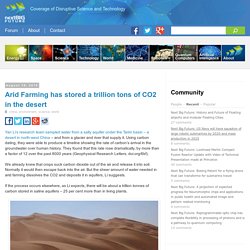
Using carbon dating, they were able to produce a timeline showing the rate of carbon’s arrival in the groundwater over human history. They found that this rate rose dramatically, by more than a factor of 12 over the past 8000 years (Geophysical Research Letters, doi.org/6kf). We already knew that crops suck carbon dioxide out of the air and release it into soil. Graphene with strontium titanium oxide able to convert 5% of waste heat of car engines into electricity. Graphene could lead to greener more fuel efficient cars in the future by converting heat into electricity.Harvesting heat produced by a car’s engine which would otherwise be wasted and using it to recharge the car’s batteries or powering the air-conditioning system could be a significant feature in the next generation of hybrid cars.The average car currently loses around 70% of energy generated through fuel consumption to heat.

Utilising that lost energy requires a thermoelectric material which can generate an electrical current from the application of heat.Currently, materials which exhibit these properties are often toxic and operate at very high temperatures – higher than that produced by car engines. ACS Applied Materials and Interfaces - Thermoelectric Power Generation from Lanthanum Strontium Titanium Oxide at Room Temperature through the Addition of Graphene SOURCE - Manchester University, ACS Applied Materials and Interfaces. POC21: "The World We Need" These Salty Oats - Reconnecting to a Sustainable Future. When I get in my car, my only hope is to reach my destination as quickly as possible, whether that destination is ten minutes away or two hours.
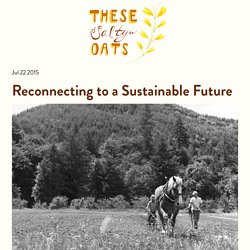
Is it time for an antibiotic-free label on our food? A post-antibiotic age in which common infections and minor injuries can kill is too frightening to contemplate. Yet it is a very real possibility for this century, says the World Health Organisation (WHO). To help slow the emergence of bacteria resistant to antibiotics we need to reduce our dependence on antimicrobial drugs and drastically cut their misuse and overuse in humans and animals, say experts. The issue was brought to a head today after pork sold by several leading British supermarkets was found to be contaminated with a strain of the drug-resistant bacteria MRSA. Experts warn that the superbug has emerged as a result of the overuse of antibiotics in livestock destined for human consumption.
Although this particular strain of MRSA poses little risk to the public, say food safety officials, there is evidence that there could be a risk of a wider health crisis unless antibiotic use is tackled. What are food companies doing? Nature gives us everything free – let's put it at the heart of everyday economic life. Natural capital is everything nature provides us for free. It is what our economy is built upon. We add man-made capital in the shape of houses, factories, offices and physical infrastructure, and human capital with our skills, ideas and science.
Natural capital should, therefore, be at the heart of economics and economic policy – but it isn’t. As a consequence we abuse nature, drive species to extinction, and destroy ecosystems and habitats without much thought to the consequences. The damage won’t go away; as we wipe out perhaps half the species on the planet this century and induce significant climate change, the economic growth we take for granted will be seriously impaired.
Just as we try to maintain and enhance our own assets – our houses, cars and our knowledge and skills – so too should the broader economy avoid running down its base of natural capital assets. Unlike the climate change problem, natural capital has a big spatial dimension. Palm oil companies exploit Indonesia's people and its corrupt politics. Throughout Indonesia, a vast archipelago draped across the equator, a human rights crisis simmers. Over the past two decades, indigenous communities have seen the government hand their land over to private companies. These companies are largely producing one of two commodities: fast-growing timber species to supply the pulp and paper industry or palm oil, a remarkably versatile edible oil.
Heineken Saved $84 Million By Using Less Water And Energy. Silicon Nanofibers could boost lithium battery energy density by ten times. Why Electric Cars Don’t Have Better Batteries. A lithium-ion battery is loaded into an x-ray device used to help researchers understand how experimental batteries work. The Best Technology for Fighting Climate Change? Trees. Global Calculator shows how the world can 'prosper' while tackling climate change.
28 Jan 2015, 07:20Simon Evans The world's population could live a prosperous, European-style lifestyle by 2050 at the same time as avoiding dangerous climate change, according to a new Global Calculator developed by the UK's Department for Energy and Climate Change (DECC). The online tool shows how global prosperity can increase, even as emissions fall by 60 per cent from current levels in line with climate targets. Tesla Motors, Inc. Has a New $9 Billion Ally (NRG, TSLA) Source: Tesla Motors, Inc. Six Transportation Trends That Will Change How We Move. GreenBiz. The Scientific Breakthrough That Will Completely Change The Electric Vehicle Market. Next Big Future: Biochar could boost agricultural yields and control pollution. Across the United States, sales of biochar, a long-lasting soil additive, have surged over the past few years.
Toyota Opens The Fuel Cell Kimono. 4 Things I Learned Driving a Tesla for 10,000 Miles (TSLA) What to Expect From Tesla Motors, Inc. CEO Elon Musk Tomorrow (TSLA) Web App. Toyota To Follow In Tesla’s Footsteps By Releasing Its Fuel-Cell Patents. The sheer size of Tesla’s massive battery factory could be a game-changer in many ways. Some People Just Throw Plastic Bottles Away, Others Make This... Move Over Tesla, this New Car is Powered by Salt Water and Has Over 900 Horsepower. It's simple. If we can't change our economic system, our number's up. What Farm-to-Table Got Wrong. This New Finding Explains Why Bees Are Disappearing. These Solar Roads Could Power The Entire Country. New adhesive system makes a circuit board that is 90% recyclable. 8 Incredibly Efficient Cars That Drive Thousands Of Miles On Just One Gallon.
Biodegradable Plastic Option From Shrimp Shells. The Top 10 Most Innovative Sustainable Buildings Of 2014. Inhabitat. Food Vision 2014: Innovation, communication, change, sustainability. Herald food writer bugs out for dinner. We need an apartheid-style boycott to save the planet. One of the most important sustainability-related articles you have never read. The promise of a bio-based economy.
Why recycling smartphone batteries is vital for sustainability. Take A Seat On This Gates-Funded Future Toilet That Will Change How We Think About Poop. The World's Largest Solar Plant Started Creating Electricity Today. ReKixx - Welcome - Sneakers with a Purpose. Sustainability Re-Constructed: Creating a New P. Sustainability Redefined: Setting a Goal of a Flourishing World. A Rechargeable LED Cork That Turns Empty Bottles Into Lamps. Shoring Up Embankments Not Only Sustains The Environment, But Can Actually Save Energy. Africa's Vanishing Forests. New York's new mayor must build on Michael Bloomberg's green legacy. The 5 Greenest Countries On Earth (And All Of The Rest), Ranked. Death by sludge, coal and climate change for Great Barrier Reef? Guardian Sustainable Business Live Chat - Global Resource Challenges - ReviewInterface Cut the Fluff.
Innovation Sighting: Task Unification Saves Lives & Money.